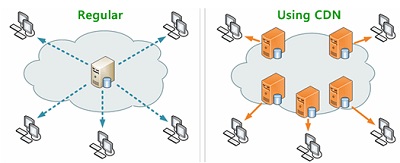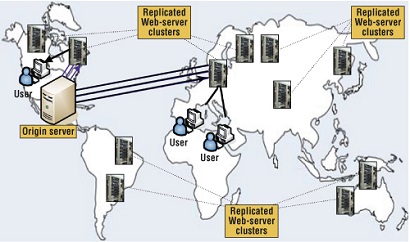CDN | Content Delivery Network
What is CDN ??
CDN stands for “Content Delivery Network” or “Content Distribution Network”.
Content Delivery Network, as the name suggests, CDN is network that provides delivery of content to the user via internet.
A CDN is a set of large ‘distributed’ servers or collection of interconnected servers on the internet and those servers are deployed on the multiple data-centers.
Simply from the name we can easily identify the purpose of the CDN is to deliver content on network (on internet) to end – users with high performance & high availability.
As I said that CDN delivers the contents which can be text, scripts, graphics, media files, documents , applications of e-commerce, social networks, live-streaming & on-demand streaming media.
How Does CDN Works ??
With High availability & High Performance and through distributed servers content is provided to end-user by CDN. But how does it work??
CDN stores and provides facility of delivering content to end –users and for that CDN operators are paid by the “Content Providers” for delivering the content. Besides this, CDN has to pay to ISP : Internet Service Providers , to network operators as they allows hosting of servers in their multiple data centers.
Multiple copies of the content are available on different server (aka Content Replication) and CDN provides an identical content at a high speed. When any user make a request for a specific page, content or file, the closest server will respond and delivers the identical copy of content i.e. users reside at different location can access the same content but from different servers
CDN acts as an service provider on the internet and it is a Performance Booster.
Advantages of Using CDN :
- CDN provides content with high performance & high availability.
- Content delivery at high speed.
- Not only provides content of content provider but also provides them some degree of protection
- Reduce bandwidth cost
- Decrease page load time i.e. loads data faster
- Increase global availability of the content
- From any geographical location user can get content with the high speed from nearby server.
- Provides backup services online.
- Performance booster and money saver
Type of CDN :
Content can be static or Dynamic so CDN can be of two type first CDN that deals with static content and another that deals with dynamic content.
Some websites use CDN for hosting images and static CSS and JavaScript files, some uses CDN for streaming HD (High Definition) videos or HD content while some (Websites having large databases) uses CDN for long term storage. This is less expensive as well as needs less bandwidth.
Another type of CDN is which deals with Dynamic content or we can say “Web Cache”. For example CMS : Content Management System.
Free CDN and Private CDN :
Many ‘Network Operators’ or companies have started to build their own CDN instead to pay third party.
Free CDN services are provided by many organizations like Yahoo, Google , Microsoft, etc. For example, instead of hosting your own videos, you can use one of the free service like YouTube.
Anothe Example is : Want to load page with Jquery, Simply writes this code :
<code><script src="https://ajax.aspnetcdn.com/ajax/jQuery/jquery-1.6.4.min.js"></script></code>
There are many CDNs are there that are not free and charges for hosting your content.
For Example : “Microsoft’s Windows Azure CDN“, “Amazon CloudFront”, “Akamai Technologies”, “Tata’s BitGravity” and many more are there.
If you like this post or do you have any query feel free to ask and comment 🙂
Thanking You.


